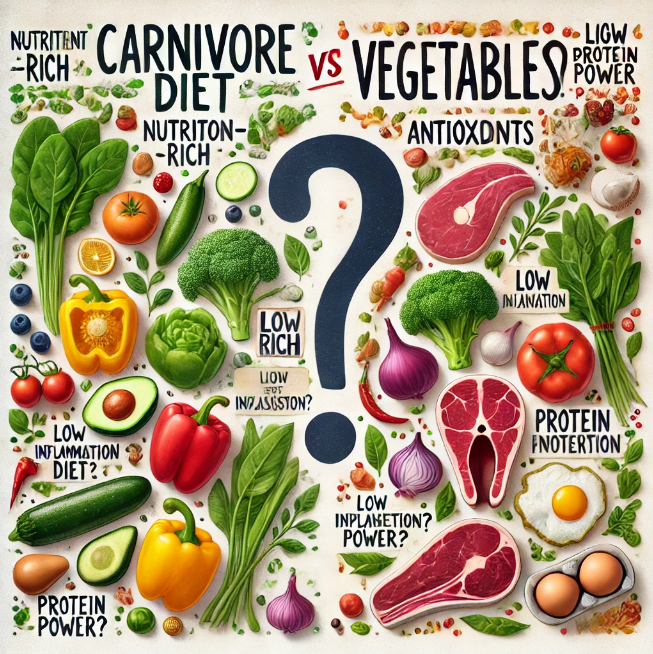Are Vegetables Secretly Plotting Against Your Joints? A Humorous Dive into the Carnivore Diet Craze, maybe even reduce the bloat
Is that kale giving you side-eye, or are your joints just acting up again?
Lately, there’s been a sizzling buzz around the carnivore diet—a dietary approach that gives the cold shoulder to plant-based foods like vegetables, grains, and nuts, and rolls out the red carpet for animal-based products like meat, fish, eggs, and dairy. One of the most eyebrow-raising claims from this meaty movement is that vegetables—yes, those leafy greens your mom told you to eat—might actually be harmful or downright “poisonous.” Let’s sharpen our steak knives and slice into this debate, with a generous side of humor.

The Anti-Vegetable Argument: Are Brussels Sprouts the Bad Guys?
Proponents of the carnivore diet argue that vegetables are loaded with antinutrients—compounds that can interfere with nutrient absorption or cause other bodily mischief. Here are the usual suspects:
- Lectins: Found in beans, grains, and some veggies, lectins are like that clingy friend who just won’t let go. They can bind to cells and may cause digestive discomfort in sensitive individuals. But fear not! Cooking usually sends them packing.
- Phytates: Present in seeds, legumes, and grains, phytates have a knack for binding minerals like iron and zinc, potentially reducing their absorption. With a little soaking or fermenting (hello, sourdough!), their effects can be minimized.
- Oxalates: Lurking in leafy greens like spinach, oxalates can bind calcium and may contribute to kidney stones in susceptible folks. So maybe Popeye wasn’t entirely in the clear.
These antinutrients have led some to avoid vegetables entirely, fearing their salads are secretly plotting joint inflammation or other health woes. Carnivore enthusiasts often suggest that animal-based products provide all the essential nutrients without these potential plant-based pitfalls.
The Sizzling Pros of the Carnivore Diet
So, what’s the beef with going full carnivore? Here are some potential benefits that have people mooing with delight:
- Simplicity: Forget meal planning; if it had a face or a mother, it’s on the menu. This straightforward approach can be appealing for those who find extensive food choices overwhelming.
- Reduced Joint Inflammation: Some folks report that ditching plant foods reduces joint pain and inflammation. Could saying “see ya” to spinach be how to reduce bloating and ease those creaky knees?
- Blood Sugar Stability: Animal-based foods contain little to no sugar, helping keep blood sugar levels as steady as a slow-cooked brisket. This stability can support weight management and hormone balance.
- Improved Digestive Health: For those with irritable bowel syndrome (IBS) or other digestive woes, cutting out fiber-heavy veggies might reduce bloating and discomfort. Less time in the restroom means more time enjoying life—or steak.
My Beef with the Carnivore Diet
Hold your horses—or cows. While the carnivore diet sounds enticing to some, here are a few reasons why I’m not ready to toss my veggies to the compost bin:
- Nutrient Deficiency: Vegetables are rich in vitamins, minerals, and antioxidants that support overall health. Skipping them entirely might lead to deficiencies in crucial nutrients like vitamin C, fiber, and phytochemicals that help fight chronic diseases and joint inflammation.
- Gut Health: Fiber from fruits, vegetables, and whole grains is essential for a happy gut microbiome. Without enough plant-based foods, you might experience constipation and a grumpy gut. And trust me, no one wants a grumpy gut affecting their mood and joints.
- Heart Health: Consuming large amounts of saturated fat and cholesterol from animal products might not be the heart-healthiest choice in the long run. While the jury is still out, it’s something to chew on.
Vegetables: Nutritional Heroes or Villains?
So, are vegetables really plotting against us? While they do contain antinutrients, their benefits generally outweigh the risks for most people. Plus, proper preparation can neutralize many of these compounds.
- Colorful Veggies: Bell peppers, carrots, and their vibrant friends are loaded with antioxidants that protect against oxidative stress and joint pain.
- Cruciferous Vegetables: Broccoli and Brussels sprouts contain compounds that may help fight cancer and reduce inflammation. They’re like the superheroes of the vegetable world—capes not included.
Is the Carnivore Diet Right for You?
While some people experience improvements on the carnivore diet, it’s important to recognize that these benefits may not be sustainable or suitable for everyone. Eliminating vegetables might lead to nutrient imbalances and long-term health risks, including joint inflammation and digestive issues.
Personally, I believe in a balanced approach—one that includes a variety of nutrient-dense foods from both animal and plant sources. After all, diversity isn’t just good for ecosystems; it’s great for your plate too.
The Final Bite
As diet trends sizzle and fizzle, it’s important to stay informed and make decisions that align with your individual health goals. Remember, food isn’t just fuel; it’s medicine for both the body and mind—and sometimes, it’s a source of joy and laughter.
Would you consider breaking up with broccoli? Or are you a veggie lover for life? Share your thoughts below, especially if you’ve found ways on how to reduce bloating or joint pain through your diet. Let’s chew over this topic together! Your Joints and Gut
Remember, your body is like a stand-up comedian—it works best when it’s well-fed, well-rested, and gets plenty of applause (or in this case, care). By addressingjoint inflammation, joint pain, and figuring out how to reduce bloating, you’ll be well on your way to feeling like the star of your own show again.
